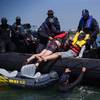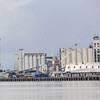Recent outbreaks of Norwalk-like viruses on cruise ships, particularly those visiting North America, have afflicted passengers and crew with symptoms of gastro-intestinal illness. Accordingly, the UK P&I Club has issued advice
to its members.
The Club points out that cruise companies visiting U.S. waters from abroad must notify the Vessel Sanitation Program of the U.S. Center for Disease Control when two per cent of passengers or crew are ill with vomiting or diarrhea. Tour companies operating wholly within the waters of a U.S. state should check with the relevant state authority about any notification or other action required.
Although Norwalk is a specific virus, its effects are similar to those of other viruses in the calicivirus family. These include nausea, vomiting, diarrhea, stomach cramps, low-grade fever, chills, headache, muscle aches and general tiredness. While symptoms appear within two days of infection, usually disappearing two to three days later, these viruses however, are very contagious and spread easily from person to person. Outbreaks almost invariably stem from individuals spreading the infection among closely concentrated people on board ship.
People can become infected from food and liquids, from placing fingers in the mouth after touching contaminated surfaces or objects, and from direct contact with infected persons. Sufferers can infect others for 72 hours after symptoms have ended. The biggest group who are at risk to others are food workers, since up to two thirds of food-borne illness cases in the United States may be due to such viruses.
There is no antiviral medication and no vaccine to prevent infection. The best treatment is plenty of water and rest, as rehydrating the body is usually the fastest way to recovery.
A strict policy of cleanliness should be maintained throughout the outbreak and afterwards. Hands should be washed frequently, contaminated surfaces thoroughly cleaned and disinfected by bleach-based household cleaner and contaminated clothing and linens removed and washed.
Infections from Norwalk and Norwalk-like viruses are not normally considered "quarantinable" illnesses, not being regarded as a danger to the general population in an open environment. It should not be necessary, therefore, to confine all shipboard persons to quarters nor to prevent ships from docking, although sanitation measures may have to be stepped up to pre-empt a quarantine order.
UK P&I Club executives and correspondents handle Norwalk-related passenger liability claims involving members, assist with quarantine and disinfection claims and provide general advice and support. The Club’s coverage includes quarantine and disinfection expenses, legal liability for medical expenses, repatriation and compensation. An optional extended cover for passenger ships includes compensation arrangements for delays or cancellations when ships are re-routed or removed from service for quarantine or disinfection.
Featured videos

Inmarsat Enhances Service to Drive Digitalization

Tracking Foreign Vessels Working in the U.S. Jones Act Market

Unlock Onboard Data Efficiencies
Subscribe for
Maritime Reporter E-News
Maritime Reporter E-News is the maritime industry's largest circulation and most authoritative ENews Service, delivered to your Email five times per week









